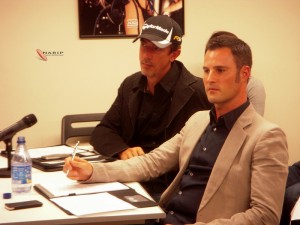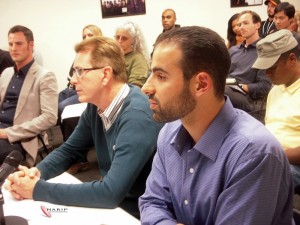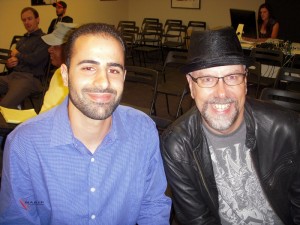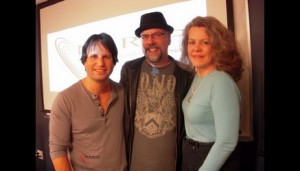By Tess Taylor. Photo (L-R): Neophonic’s PJ Bloom, Michael Brandvold of Michael Brandvold Marketing, NARIP’s Tess Taylor.
We exported PJ Bloom (Glee, Nip / Tuck, CSI Miami, American Horror Story) from Los Angeles to San Francisco this week for the latest NARIP Music Supervisor Session. Armed with a brief of PJ’s current music needs, participants pitched directly to him to get immediate, detailed feedback about his likes and dislikes, how he prefers to receive material, and how best to approach the wild world of intensely competitive music placement.
“We live in this cartoon world [the music biz] and the challenge is how to survive in it and not have to get a ‘real’ job,” PJ chuckled. “It can be done.” During the session, he described his path and offered useful macro (career path) and micro (how to get more placements) advice.
Relationships (Part 1)
From the start PJ emphasized the importance of relationships in the “analog world.” He said he’s just deactivated his Facebook profile, and “it feels great, it’s cathartic!”
“The Internet is purposeful,” he went on, “but it’s not everything.” Many people rely too heavily on the digital domain, but it’s OK to live outside the Internet, call someone and meet for coffee. “For all my acceptance and understanding of the digital domain, what I was able to achieve in analog world was important,” he said.
NARIP created its Music Supervisor Sessions to this end, to enable people to meet in an intimate and professional setting, and enable an opportunity for direct and immediate feedback to music that is normally difficult to get.
Here is feedback from PJ to music presented at NARIP’s session:
- “Exceptional production quality… I like what you do!” he said to Ben Bidlack’s Darkness Breathes and Questia
- To Cinemasters’ Joel Evans: “Great stuff, feels good, does what it’s supposed to do. There aren’t many people these days who can effectuate the kind of quality you offer here… excellent for creating atmosphere.”
- To Philippe Moebius: “Best thing about this music is his sense of space… it’s very well-produced and multi-dimensional.”
- To Boyfriend Academy’s Tony Smith: “That’s really cool, I love the track (Heartsichord) and could absolutely use the instrumental.”
- To Hisham Dahud: “It has a good organic feel to it (Fallen Angel) and I totally get what you’re doing.”
PJ Bloom Tips To Maximize Music Placement:
- Our world is schedule-based. As time passes money is being spent, so the best way to solidify relationships with [music] buyers is to let us know that you’re there to do what we need when we need it. Quick turn-around is essential.
- I prefer digital files, no less than 320 [bit rate] – I’ll accept less but don’t like it. I prefer a download link that takes me to a digital delivery system with a player. I like Box.net.”
- Less is more.
- I’m a sucker for a key change or a bridge.
- Don’t be common. The more uncomfortable you make people feel [with your music], the more success you will have… For me to *not* understand what you’re doing [musically] is a big win.
Best Advice
PJ’s best advice to people wishing to license more material is to “be nimble.” The biggest problem for sellers of music (anyone wishing to license) he said is that all buyers want to receive music in different ways. The difficult part is understanding the client / buyer, especially when one may not have direct access to them. He recommended to those who pitch to figure out a service that allows the widest swath of buyers of music and caters to their preferences. The reality he said is, “If you don’t give it [music] to me the way I want it then I will move past it quickly.”
What are composers paid?
A composer for a network television show can make between $10,000 to $20,000 per episode or more, and this typically comes with stipulations such as a minimum number of “live” musicians per episode as networks are loathe to pay these types of fees for synthesizer music. The goal is to have as much original music for each show as possible.
Surviving in the Cartoon World of the music biz relies heavily on relationships, said PJ, and his most encouraging advice of the evening came in response to a question from John Frazier, a young composer / producer, who asked how to get a foot in the door and reach someone like PJ.
PJ’s response was blunt and thoughtful. “To be a creative person and hope that you’ll get your creativity in the hands of people like me who can use is not really based in reality,” he said. “I don’t make a business out of plucking people out of obscurity, although I love it when it happens.”
“The way I did it and the way most successful people I know have done it,” said PJ, “was all relationship-based.” Develop relationships with people at similar level to you with a similar work ethic who inspire you creatively… and whom YOU inspire. Take the journey individually and collectively, and rise up together.
“I was struggling and just want ed to be in music, I wasn’t even defined enough to say I wanted to be music supervisor,” he said. “I was just the dude who made compilation tapes for parties. I had friends who wanted to be screen writers and film directors, and as we moved forward in our respective careers, they did their student and indie films and I was there to music supervise their projects. In a creative environment with people similar to you – whether you’re just starting out or at the top of your career – there is just more opportunity this way than with the approach, ‘I’ll just make a CD and get it to as many A&R people as I can, someone will pluck me out of obscurity and I’ll be a rock star!’ That’s the lottery ticket career path, and it’s not for me.”
ed to be in music, I wasn’t even defined enough to say I wanted to be music supervisor,” he said. “I was just the dude who made compilation tapes for parties. I had friends who wanted to be screen writers and film directors, and as we moved forward in our respective careers, they did their student and indie films and I was there to music supervise their projects. In a creative environment with people similar to you – whether you’re just starting out or at the top of your career – there is just more opportunity this way than with the approach, ‘I’ll just make a CD and get it to as many A&R people as I can, someone will pluck me out of obscurity and I’ll be a rock star!’ That’s the lottery ticket career path, and it’s not for me.”
“This business is manageable”
“This business is manageable, you can do it and survive. The goal for all of us is NOT to live in the real world. We have an urge to create inside that pushes us forward and we don’t want to sit in a cube and push a pencil. Chasing the lottery ticket is the wrong move.”
“So don’t worry about getting to me because if you’re amazing, I’ll find you, we’ll connect,” he told John. “Just do your thing, work your craft, learn your skill set, and surround yourself with people who help your journey. You’ll look up every so often and be farther along. That was my career path. There wasn’t any great moment where I shot up to stardom, it was a slow build, and that’s OK. It’s a long journey.”
Shine Through
“If you want do it [be in this business], just live it. You may have unbelievable success and you may never achieve anything, but don’t worry about a schedule or getting through to certain people, just do your thing and it will shine through.”
© 2011 Tess Taylor, all rights reserved.
# # #
 Audio from this session can be purchased at our Online Store.
Audio from this session can be purchased at our Online Store.
Click here for photos from our San Francisco Session with PJ Bloom
Photo (L-R): Cinemasters’ Joel Evans and Hypebot’s Hisham Dahud during pitch session, receiving feedback to their music from PJ.

